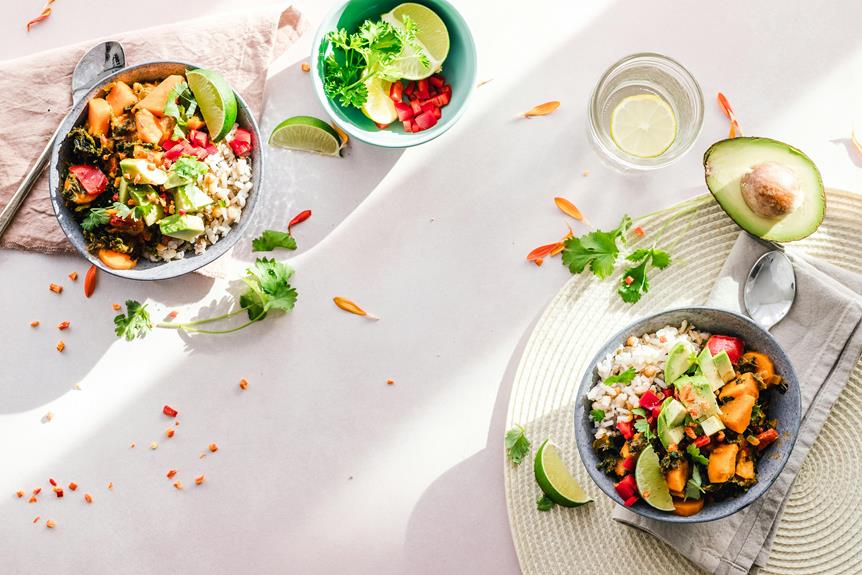
Blog
How Can I Maintain a Healthy Diet During Pregnancy for Babys Wellbeing?

Maintaining a healthy diet during pregnancy is vital for your baby's wellbeing. Fuel your body with essential nutrients from fruits, veggies, and lean proteins. Ensure you get key nutrients like folic acid, iron, calcium, and proteins for your baby's development. Avoid harmful foods and plan balanced meals with a mix of healthy options. Remember, consulting your healthcare provider for personalized guidance is crucial. Your baby's health depends on what you eat.
Importance of Nutrient-Rich Foods
To maintain a healthy diet during pregnancy, prioritize nutrient-rich foods for optimal nourishment and well-being. Your body is undergoing significant changes, and it's crucial to fuel it with the right nutrients.
Incorporating a variety of fruits and vegetables into your meals provides essential vitamins, minerals, and antioxidants that support both your health and your baby's development. Foods like leafy greens, berries, citrus fruits, and sweet potatoes can boost your immune system and help prevent certain birth defects.
Lean proteins such as chicken, fish, beans, and lentils are vital for your baby's growth and development. They also help in maintaining your energy levels and promoting muscle strength.
Including whole grains like oats, quinoa, and brown rice in your diet can provide a good source of fiber, which aids in digestion and helps prevent constipation, a common issue during pregnancy.
Key Nutrients for Babys Development
Key nutrients essential for your baby's development include vitamins, minerals, and proteins sourced from a variety of foods in your diet. During pregnancy, it's crucial to ensure you're consuming enough of these key nutrients to support your baby's growth and overall health.
Vitamins such as folic acid, which can be found in leafy greens, citrus fruits, and fortified grains, play a significant role in preventing birth defects in the baby's brain and spinal cord. Iron is another essential nutrient that helps in the production of hemoglobin to support the increased blood volume during pregnancy. Good sources of iron include lean meats, beans, and fortified cereals.
Calcium is vital for the development of your baby's bones and teeth. Dairy products, fortified plant-based milks, and leafy greens are excellent sources of calcium. Additionally, proteins from sources like lean meats, poultry, fish, eggs, legumes, and nuts are essential for your baby's overall growth and development. Ensuring a well-rounded diet rich in these key nutrients is crucial for supporting your baby's development during pregnancy.
Foods to Avoid During Pregnancy
During pregnancy, it's crucial to be mindful of certain foods that should be avoided to ensure the health and safety of both you and your baby. Raw or undercooked meats, including deli meats and hot dogs, can harbor harmful bacteria like listeria, which can lead to serious complications. It's best to opt for well-cooked meats to reduce the risk of foodborne illnesses. Additionally, unpasteurized dairy products should be avoided as they may contain harmful bacteria such as E. coli or Salmonella.
Certain types of fish high in mercury, such as swordfish, shark, king mackerel, and tilefish, should be avoided during pregnancy as mercury can harm the baby's developing nervous system. It's recommended to choose low-mercury fish like salmon, shrimp, and catfish instead. Alcohol consumption should also be strictly avoided during pregnancy as it can lead to fetal alcohol spectrum disorders.
To ensure a healthy pregnancy, it's important to steer clear of these foods and opt for safer alternatives to support the wellbeing of both you and your baby.
Meal Planning Tips for Expectant Mothers
As an expectant mother, incorporating a variety of nutrient-rich foods into your daily meals is essential for supporting your and your baby's health during pregnancy. When meal planning, aim to include a balance of fruits, vegetables, whole grains, lean proteins, and dairy products to ensure you're getting all the necessary nutrients.
Start your day with a nutritious breakfast that can include whole grain cereals, fruits, and yogurt. Snack on nuts, seeds, or cut-up veggies to keep your energy levels stable throughout the day. For lunch and dinner, focus on incorporating lean proteins like chicken, fish, beans, or tofu along with plenty of colorful vegetables.
Don't forget about hydration – drink plenty of water throughout the day to stay well-hydrated. Planning your meals ahead of time can help you make healthier choices and avoid relying on convenience foods. Listen to your body's hunger and fullness cues, and try to eat smaller, more frequent meals to help with digestion and prevent discomfort. Remember, a well-rounded diet is key to a healthy pregnancy for both you and your baby.
Consulting a Healthcare Provider for Guidance
For personalized advice on maintaining a healthy diet during pregnancy, consult your healthcare provider for guidance. Your healthcare provider is a valuable resource who can offer tailored recommendations based on your individual health needs and pregnancy requirements. They can provide insights on specific nutrients crucial for you and your baby's health, suggest appropriate portion sizes, and address any dietary concerns you may have.
During your prenatal visits, make sure to discuss your current eating habits, any food aversions or cravings, and any challenges you encounter in following a healthy diet. Your healthcare provider can help you navigate these issues and offer practical solutions to ensure you're meeting your nutritional needs.
In addition to dietary advice, your healthcare provider can also monitor your weight gain, assess your overall health, and identify any potential risk factors that may impact your pregnancy. By collaborating with your healthcare provider, you can feel confident that you're making informed choices to support both your own well-being and your baby's development.
